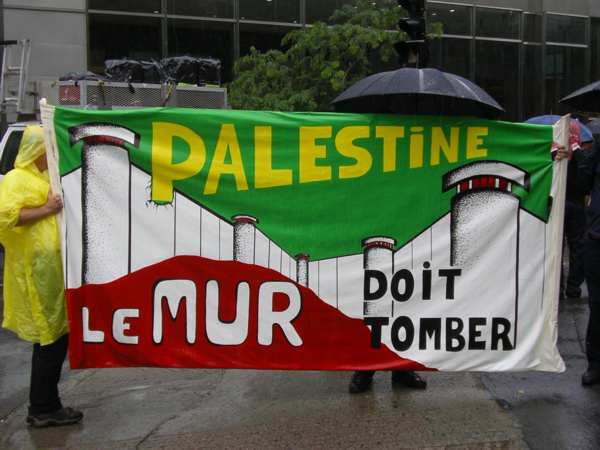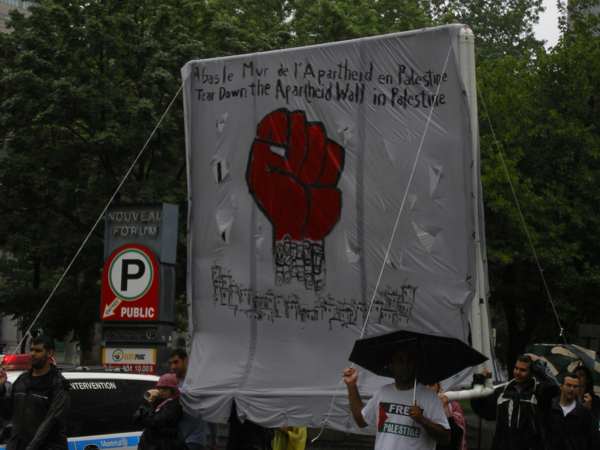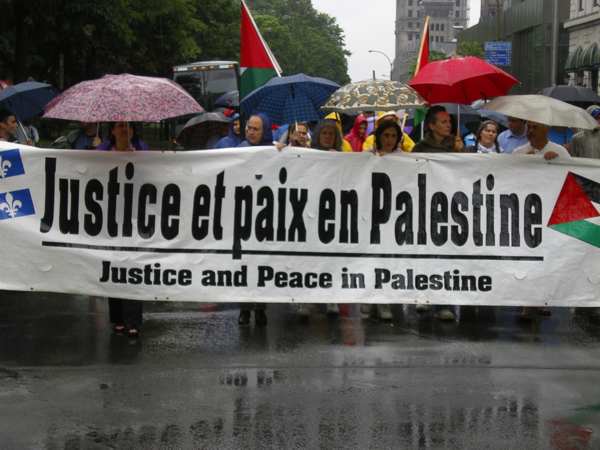
THE HANDSTAND
july 2005

Dear All,
So much appalling has been happening the past several
days, that it is hard to keep up. Whenever I think
‘these are the worst of times,’ I’m proven
wrong. Times continue steadily to worsen for
Palestinians.
There will undoubtedly be a backlash. When?
How? I don’t know. But how much can a
people take? Violence breeds violence. And, if
there is one thing that the 9/11 attacks in NY and the
bombs in London show, it is that even mighty military
powers cannot protect their citizens from wrath.
Israel’s leaders and people should take heed.
This evening we demonstrated across the street from the
Defense Minister’s office to protest the killing of
a Palestinian youth yesterday at Beit Lekiya, the
family’s 2nd son killed by Israelis.
Saddly, people in the
cars that drove by had no idea of what we were
protesting. Israelis don’t
hear even when acts as these are reported. They
don’t want to hear. At the demonstration we
learned from Anarchists Against the Wall who had gone to
the youngster’s funeral that today another 2 boys
from the village had been shot with rubber bullets, one
having been hit in the head. Is it coincidental
that this 12 year old was the main witness to the
shooting yesterday? Just now at midnight, the
Israeli radio news reported that 3 had been hit. It
said nothing about their condition. The guard who
killed the boy yesterday, was initially taken into
custody, but not surprisingly today was released,
conditionally, but nevertheless released. He says
that the boys were throwing stones and that he felt
threatened. The Palestinians claim that the
youngster was not throwing stones. Who cares?
Any excuse is as good as another to kill Palestinian
kids!
At Bei’lin, the demonstrations continue, and so does
IOF violence. Another village, Immatin, is
also feeling IOF aggression as villagers protest
expropriation of land and uprooting of trees for the
construction of the wall. A number of villagers
have been injured there in recent days. And the
wall continues to go up separating Palestinians from
their lands.
There have also been incursions into one village or
another, almost daily.
I include below 3 items--a small selection of the events
of the past several
days. The first is a summary of an IWPS report
about an incursion to Hares. The second is a call to
action. The 3rd is a report by Amira Hass about
gates in the Wall. The latter is about the gates in
one village, but
represents the reality on the ground in Mas’ha and
many other villages as well.
You can learn more about the demonstrations against the
route of the wall from http://www.stopthewall.org , and reports about IOF human rights
violations at http://www.iwps.info.
In a separate email, I send you a personal depiction of
the routine at
Kalandia checkpoint, written by a woman who has spent
many hours monitoring there as a member of
Machsomwatch. For more about daily occurrences at
checkpoints see http://machsomwatch.org,
May we someday see better times.
Dorothy
-------------------------------------------------------------------------------------------
from: IWPS@palnet.com. ***Israeli army invades West Bank
village using a 16 year old boy as human shield and
beating 2 women, including one 8 months pregnant*** For
Immediate Release
Date: July 10, 2005
Time: 12:30 a.m.
HARES is a village in the Salfit district of the West
Bank. At approximately 1:00 a.m. on Thursday July
7, an estimated 60 Israeli soldiers entered Hares on
foot. Additionally, at least 13 jeeps and one large
military vehicle were observed entering the village. At
approximately 2:00 a.m. they entered at least 5 houses,
breaking windows, firing sound bombs and live ammunition.
They forced families including small children to sit
outside at gunpoint while they searched the houses using
dogs.
During the operation soldiers used 2 people as human
shields, including one 16-year old boy. They also beat
several residents, including a woman who is 8 months
pregnant. Additionally they ordered a Palestinian woman
to take off her clothes, but she refused. They
threatened to kill her if she didn’t tell where her
husband was. In another home a woman reported that
the army took a gold ring and over $1,000 Jordanian
dinars from her handbag.The army captured and took four
men. The location and reason for the detentions are
unknown. The incursion lasted approximately 5 and one
half hours, from 1:00 a.m. to 6:30 a.m.
For further information, please contact the IWPS Office:
09-2516-644
Mobile: 054 584 3952 or IWPS@palnet.com.
International Women's Peace Service (IWPS)
Hares, Salfit
Telephone: 09 251 66 44
-----------------------------------------
Y. Harel
Occupation Magazine
www.kibush.co.il
----- Original Message -----
From: CPTnet editor, Webster, NY
To: menno.org.cpt.news@MennoLink.org
Sent: Friday, July 08, 2005 4:21 PM
Subject: HEBRON URGENT ACTION: Largest tract of land ever
confiscated in history of Hebron District to take place
19 July 2005
CPTnet 8 July 2005
HEBRON URGENT ACTION: Largest tract of land ever
confiscated in history of Hebron District to take place
19 July 2005
Two military orders, T/06/05, and T/93/05 issued on 28
June 2005, if carried out, will confiscate the farmland
of fifty Palestinian families (500 people) living in the
village of Tarqumiya in the Hebron district. The
order stipulates that Israel will confiscate ninety-seven
dunums for building the Security Barrier/Annexation wall,
but in actuality the military will also confiscate 500
dunums (125 acres) behind the fence. This tract is
the largest amount of land ever confiscated in the
history of the Hebron District. Telem, an Israeli
settlement in the southwest corner of the West Bank, will
expand onto the land, currently growing olives, grapes,
and field vegetables. The land confiscation
will take away income of fifty families.
The military gave the families a deadline of 19 July 2005
to respond. A
final court decision will occur on that day.
Israeli authorities claim that they will build gates in
the new wall so that farmers can go onto their
land. However, the Israeli government, in other
previous land confiscations, did not build the gates it
promised. Instead, it issued permits farmers for
two weeks and then discontinued them.
World attention
is focused on settler removal from the Gaza Strip,
allowing land confiscation by the Israeli government in
the West Bank to move ahead, unchallenged. The Hebron team's prior Urgent Action
in April asked people to protest a military confiscation
order for Beit Ummar farmland that went unchallenged by
members of congress. Seventy-four families in Beit
Ummar lost their land.
Please contact your Senators or Members of Parliament to
urge them to call for a stop to this confiscation within
the next week, noting the 19 July
2005 deadline. Ask them to contact the Foreign
Ministry (Canada and U.K), State Department (U.S.) and
the Israeli Government to express their opposition to the
largest land confiscation in the history of the Hebron
District.
Because of the 19 July 2005 deadline, CPT is asking its
constituents to phone or fax their legislators rather
than write letters. If you asked your
legislator to challenge the confiscation of Beit Ummar
land, mention that in the fax/phone call.
Note that confiscating Palestinian land for the
expansion of Israeli settlements is at the root of most
of the violence in
Israel and Palestine.
U.S. CITIZENS
All members of the US Congress: 202-224-3121 For
fax numbers, go to: http://congress.org and enter your zip code.
CANADIAN CITIZENS
You can obtain your elected representative's contact
information by calling
1-800 0 CANADA (622-6232); Fax numbers are available at
http://www.parl.gc.ca/common/senmemb/house/members/MemberList
UNITED KINGDOM CITIZENS
Find contact information for your MP at
http://www.parliament.uk/directories/directories.cfm

Gate to nowhere
http://www.haaretz.com/hasen/spages/597434.html
Hebrew: http://www.haaretz.co.il/hasite/pages/ShArtPE.jhtml?itemNo=597603
By Amira Hass
Last update - 03:02 08/07/2005
For the past two months and more, 7,500 olive saplings
ready for planting have lain scattered about the village
of Qafin, in the northwest area of the West Bank. Al
Ahali, an association from Nazareth, donated the trees as
part of an effort to help Palestinian farmers who have
been adversely affected by the separation fence. The
saplings are growing, their roots have begun to stretch
their tight nylon wrapping, and the budding leaves have
begun to go dry, but the unlucky villagers cannot plant
them. We went there to find out why.
Most of the village's farmland - 5,000 of the 8,200
dunams (1,250 of 2,050 acres) - is on the opposite side
of the separation fence from their homes. According to
the calculation of Tawfiq Harsha, the head of the local
council, about 100,000 trees, mostly olive, are still
growing in this area, after 12,600 were uprooted during
the building of the fence. On the land between the groves
people grew wheat, tobacco, watermelons and okra - crops
that require daily care.
While the fence was still being built, the defense
establishment promised
the farmers they would have regular access to their land
through a special gate. In response to the farmers'
concerns, Gil Limon, from the office of the Israel
Defense Forces' legal adviser in the West Bank, wrote, on
September 23, 2003, to attorney Fathi Shbeita of the
Israeli town of Tira: "The problem described in your
letter, regarding the absence of an agricultural gate in
the area of Qafin village, is being dealt with by the
Civil Administration with the intention of defining the
appropriate gate through which the residents will be able
to reach their lands."
On October 12, 2003, about two months before the
completion of the gate in the area, Danilo Darman, also
from the legal adviser's office, informed Shbeita that
"a suitable place has been found for a separate
agricultural gate for the residents of Qafin and the work
in this matter is in an advanced stage. I am hereby
updating you that the entry permits for the residents of
Qafin are ready at the District Coordination and Liaison
office [DCL], Tul Karm, and all your clients and their
neighbors have to do, is go to the DCL and get the
permits."
Really?
Very distant relations
The requests are filled out at the town hall, from where
they are sent to
the Palestinian DCL in Tul Karm, which forwards them to
the Israeli DCL (a unit of the Civil Administration),
which approves or rejects them. Qafin has a population of
9,000. Six-hundred families - between 3,000 and 3,600
people - have land and trees on the other side of the
fence. In May of this year, 1,050 villagers applied for
permits to access their land. Only 70 were granted them,
600 got a negative reply and the rest, 380 people,
received no reply at all. One of the common reasons for
rejections is a "distant relation" status -
that is, the applicant is too distant a relation to the
landowner, a situation that supposedly does not justify a
permit.
In this way, the requests of two of the three sons of Abd
al-Rahim Kataneh, a 61-year-old farmer who has 80 dunams
(20 acres) of land (which are registered in his name),
were rejected because they are "distant
relations." The third son did not even get a reply.
Sharif Kataneh, 70, who asked for a permit for him and
his wife to work on lands registered in the name of his
father and his father-in-law, received a partial permit:
He can enter, but his wife was turned down because she is
a "distant relation."
After the request of Ribhe Amarneh, 48, and his brother
to work land that is registered in their uncle's name was
also rejected because of a "distant relation"
status, Amarneh submitted a request through the village
of Akkabe, whose residents are descended from Qafin
families, and received the permit. Now he can at last
check the damage done to his trees, he said. A fire
erupted in his olive grove in mid-May. He stood behind
the fence, a 10-minute walk from the grove, and could do
nothing. The Palestinian firefighters did not get there
in time either, because coordination with the army is
needed to cross the fence, but the fire did not take that
into account.
Amarneh's entry permit is via Gate 5. Tawfiq Taami, also
from Qafin, has a permit to enter via Gate 12, which is
close to the village and the closest to most of the
farmlands. However, it is defined not as an
"agricultural gate," but as a "military
gate." True, in the season of the olive harvest, the
army allowed people through the gate, but even then it
was opened only three times a day for a few minutes and
then shut.
Seven of us - five Palestinian farmers and two Israelis -
waited behind the
barbed-wire fence until a Jeep arrived from which a
redheaded soldier emerged who did not conceal his
surprise at seeing us there.
"There is no entry from here," he said.
"This is only for the olive harvesting season."
"But the Civil Administration permits say Gate
12," we insisted.
"What is 12?" the soldier said, perplexed.
"All I know is that this is Gate
346."
Following several clarifications on the wireless, he was
persuaded that
Gates 346 and 12 are synonymous, but that did not change
his mind.
"There is no entry to Israel from here," he
said.
"They don't want to enter Israel, they want to enter
their land," we
explained.
"To be politically correct, it is all Israel,"
he replied. After consulting
some more on the wireless, the soldier announced that the
Haaretz
correspondent and photographer were permitted to cross -
but not the Qafin residents whose land is on the other
side of the gate.
"This is a DCL permit," the soldier explained.
"The army is not obliged to work according to
it."
He sent us to Gate 1, the old Bartaa gate, which lies
three kilometers to
the north. The villagers listened to this exchange with
astonishment. That
gate, which is adjacent to an armored observation site,
is usually closed.
It is opened only in ultra-special cases, after various
forms of coordination, and not for agricultural purposes
- but they agreed to try.
After making our way three kilometers on a battered rural
road, we reached Gate 1, which was closed. We continued
to Gate 5, which is located at the Reihan terminal, a
vast structure offering free passage for settlers'
vehicles and carefully monitored foot passage for
residents of the villages west of the fence.
Reihan terminal is 12 kilometers from Qafin and it is not
served by public transportation. Those without a car -
namely, most of the village
residents - must order a taxi and pay NIS 30. No taxis
can pass through the terminal, and mules are also barred.
To remove all doubt, a sign next to the pedestrians' gate
states: "No passage of goods, electrical appliances,
animals, clothes, vehicle parts, etc."
We got out next to the armored observation tower, from
which a disembodied Hebrew voice called, "Hey, hey,
where to?" The head of a soldier peeked out from the
high opening. "We are from Haaretz and these are
farmers who are going to their land." He undoubtedly
called his mother unit and then got back to us: "So
why not in a car?" he shouted from on high.
"Because that is forbidden," we replied.
"Do you know them all?" he asked. It was clear
from his questions that he had never encountered a farmer
who had come to work his land, and he had not been
briefed by his commanding officer about the nature of the
place.
From there we proceeded on foot. Hilly terrain, with
green slopes and rises, lies across the road that leads
to Bartaa. We walked between the trees, the ocks and the
valleys. It was about two kilometers to Amarneh's
scorched grove. It is about four kilometers to Taami's
land. Amarneh decided to continue; Taami had had enough.
If he had gone on to his land, his day would have looked
like this: 24 kilometers from Qafin to the Reihan
terminal and back, at a cost of NIS 60; an hour's wait at
the terminal; four kilometers and NIS 6 for the round
trip between Reihan and Gate 1; and another eight
kilometers on foot back and forth. By the time he reached
his land, he would have had to return. In any case,
without implements or saplings he could have done no more
than tear off a few dried leaves and loosen the soil with
his hands.
"It's an outing, no more," Taami summed up.
"A whole day just to cry next to our neglected soil
and return, and pay NIS 66 which nobody has."
The IDF Spokesperson's Office said in response that in
the days ahead representatives of the IDF and the Civil
Administration will visit the place in order to find a
solution to the problems raised in this article.
